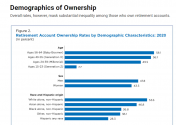Tl;dr - Americans just have zero reason whatsoever to save money and not maximize consumption/happiness: either risks to future income are completely insurable due to the ingenious U.S. financial sector and/or the longest stretch of nonstop peaceful economic development (2+ centuries and counting) ever recorded anywhere in the world with the stable labor markets have simply obliterated all uncertainty and risk that may induce US households to do the precautionary savingsCorrect: the intertemporal choice model explains this. Individuals save money in order to hedge against the risk of potentially being unable to earn money in the future - the most obvious risk is aging, individuals cannot work when they are old; as well for disability, family crises, and unemployment. However, the fabulously efficient U.S. financial sector as well as the hypercompetent Department of Labor - Employee Benefit Security Administration implementing ERISA has made it so that retirement is a completely insurable risk through various kinds of tax-advantaged accounts such as a 401(k) and 403(b) where employees are able to deploy savings to the capital markets and fund the next generation of U.S. corporate CapEx across the entire risk-spectrum (depending on the employees risk preferences) - everything from water pipes in Philadelphia from the American Water Works Company, to data centers from Digital Realty, to software R&D by Microsoft, and IC design by Nvidia. This allows for employees to earn marvelous returns on their retirement savings when those savings are deployed for capital projects that will permanently increase total productivity into perpetuity. Health and retirement risks are similarly insurable - the massively innovative US financial sector has created affordable and mass-market life, health, and disability insurance products that are able to be uniquely capable of pooling and transferring risk in order to completely erase the need for households to save in case of family crises, disability, or health.
Finally unemployment - unemployment is simply an incredibly rare thing for white collar workers in the U.S. (see - ). Thus, it’s simply not a risk white-collar office workers need to pay much attention to, and what’s more: since the U.S. has been a bastion of political stability and peace for centuries, much longer than any other country, there simply isn’t any cultural factor that necessitates savings or any inherent pessimism about the future. Unlike Europe which had WWI and WWII and the spectre of communism throughout the 20th century, or in Asia where it had the violent Japanese empire, WWII, and (again) the Cold War (Vietnam/korea) and then the 1997 AFC all across; the U.S. since 1787 has been a story of total serene peace on its homeland (outside of 2 census blocks in Hawaii on Dec. 7, 1941 and a geographically isolated civil war limited solely to uninfustrialized southern backwaters*) and 2% growth y/y and capital formation year after year after year for 2+ centuries. Obviously, this political history will cause Europeans and Asians to cautiously save in case of future risks but will cause Americans to splurge like there is no tomorrow because tbqh, tomorrow will come and it will be just as prosperous (if not more than today) into perpetuity so they don’t need to cut their consumption.
*obviously, the peaceful and serene political history doesn’t apply to black individuals in the U.S. who dealt with slavery and Jim Crow, and as Milton Friedman pointed out, black individuals have higher savings rates than white individuals at all levels of income () but since black individuals are 13% of the U.S. population, it has negligible effects on national accounts
You are using an out of date browser. It may not display this or other websites correctly.
You should upgrade or use an alternative browser.
You should upgrade or use an alternative browser.
American Economics Thread
- Thread starter Bernard
- Start date
There's no way that this isnt trollingTl;dr - Americans just have zero reason whatsoever to save money and not maximize consumption/happiness: either risks to future income are completely insurable due to the ingenious U.S. financial sector and/or the longest stretch of nonstop peaceful economic development (2+ centuries and counting) ever recorded anywhere in the world with the stable labor markets have simply obliterated all uncertainty and risk that may induce US households to do the precautionary savings
Tl;dr - Americans just have zero reason whatsoever to save money and not maximize consumption/happiness: either risks to future income are completely insurable due to the ingenious U.S. financial sector and/or the longest stretch of nonstop peaceful economic development (2+ centuries and counting) ever recorded anywhere in the world with the stable labor markets have simply obliterated all uncertainty and risk that may induce US households to do the precautionary savings
That is an completely insane and asinine statement
---
100 million Americans have medical debt. That is one-in-three Americans.
As a result, medical debt is the leading cause of bankruptcy.
---
One-in-three Americans avoid prescriptions because of the cost of medicine.
"half of Americans (51%) now have trouble handling out-of-pocket insurance expenses, according to a ."
---
Until recently, "doctors and hospitals [could stick] consumers with a “balance bill” when they can’t agree with insurers on a fair price."
---
You see far too many examples where a privatised US healthcare system operates in a predatory manner to extract as much profit as possible.
theguardian.com/money/2023/dec/11/medical-debt-healthcare-affordability-inflation
Nah: this is just a case of “big number bad” survey tendencies in responses. 73% of Americans are satisfied with the cost of their own expenses ()zOne-in-three Americans avoid prescriptions because of the cost of medicine.
"half of Americans (51%) now have trouble handling out-of-pocket insurance expenses, according to a ."
The survey responses end up just being respondents being mad stuff isn’t free since when you ask them more specifically, they demure and admit they actually like their things.
manqiangrexue
Brigadier
LOL @chgough34 arguing with himself, like some mental gynmastics athlete snapping his back from twisting:
@chgough34 The US economy is so strong and people are so confident that people don't have any reason to save money. Half of Americans don't even know what saving is; as a matter of fact, they're pissed off to see any money on the table at all because they're angry that it hasn't been converted to instantaneous fun! They are confident that whatever happens, the US economy will handle it and bail them out easily. That is why the lower the savings rate, the higher the confidence in the economy and the stronger the economy.
Also @chgough34 : No, that's bullshit. Americans now have a savings rate that's higher than ever, debunking the claim that most Americans live paycheck-to-paycheck. The increase in savings is the key sign of a strong and confident ecnomy.

@chgough34 The US economy is so strong and people are so confident that people don't have any reason to save money. Half of Americans don't even know what saving is; as a matter of fact, they're pissed off to see any money on the table at all because they're angry that it hasn't been converted to instantaneous fun! They are confident that whatever happens, the US economy will handle it and bail them out easily. That is why the lower the savings rate, the higher the confidence in the economy and the stronger the economy.
Also @chgough34 : No, that's bullshit. Americans now have a savings rate that's higher than ever, debunking the claim that most Americans live paycheck-to-paycheck. The increase in savings is the key sign of a strong and confident ecnomy.

So you don't trust the survey that invalidates your point but then picks survey results that support your point?Nah: this is just a case of “big number bad” survey tendencies in responses. 73% of Americans are satisfied with the cost of their own expenses ()z
The survey responses end up just being respondents being mad stuff isn’t free since when you ask them more specifically, they demure and admit they actually like their things.
Cherry picking data is not indicative of a reasonable response.
Now more people can't pay are those who actually have health insurance because our of pocket costs are so high.
Almost half of Americans have no retirement savings. So wheres that amazing retirement fund for Americans. Btw having 100k in a retirement account doesn't mean much these days. Need at least 500k or more.
Okay, seriously now, how many young people can afford to buy a house in America nowadays?
How long do the young people have to have living arrangements like that old TV show?
That is the cost of living paycheque to paycheque.

It was unrealistic even during the 90s.
No: it’s a very well established pattern that in survey responses, “X is bad but my experience with X is good” consistently shows up. Same here, with healthcare.So you don't trust the survey that invalidates your point but then picks survey results that support your point?
Yes, hospital debt will increase. Part of the broader trend in healthcare is that individual practices are becoming consolidated into larger hospital chains. Medical debt, is also, uncommon -
Now more people can't pay are those who actually have health insurance because our of pocket costs are so high.
- especially since the ACA has mandated out-of-pocket ceilings for health insurers
For lower-income Americans who will get near income replacement from social security and/or sale of home equity, they simply have no need to have retirement savings.Almost half of Americans have no retirement savings. So wheres that amazing retirement fund for Americans. Btw having 100k in a retirement account doesn't mean much these days. Need at least 500k or more.
Tl;dr - Americans just have zero reason whatsoever to save money and not maximize consumption/happiness: either risks to future income are completely insurable due to the ingenious U.S. financial sector and/or the longest stretch of nonstop peaceful economic development (2+ centuries and counting) ever recorded anywhere in the world with the stable labor markets have simply obliterated all uncertainty and risk that may induce US households to do the precautionary savings

Americans can also liquidate their real estate to use for retirement, or live with their children.
There's also people who are just going to rely on Social Security.
The reality is though, that Americans can save, should save, but don't save. I suppose there's also people who do save but don't realize they save... I did have to explain people's contributions and employee match rate more than once. Which to be fair, is kind of understandable since it can be very confusing.
I mean, I'm not conservative at all. Not by a long-shot, but personal behavior, habits, and general financial habits of the average American are short-sighted and just... pretty-terrible. Financial security is a big deal and more people need to take it seriously. Yeah it might impact the economy a bit negatively, but it would be a great thing for the long-term health of the country.
